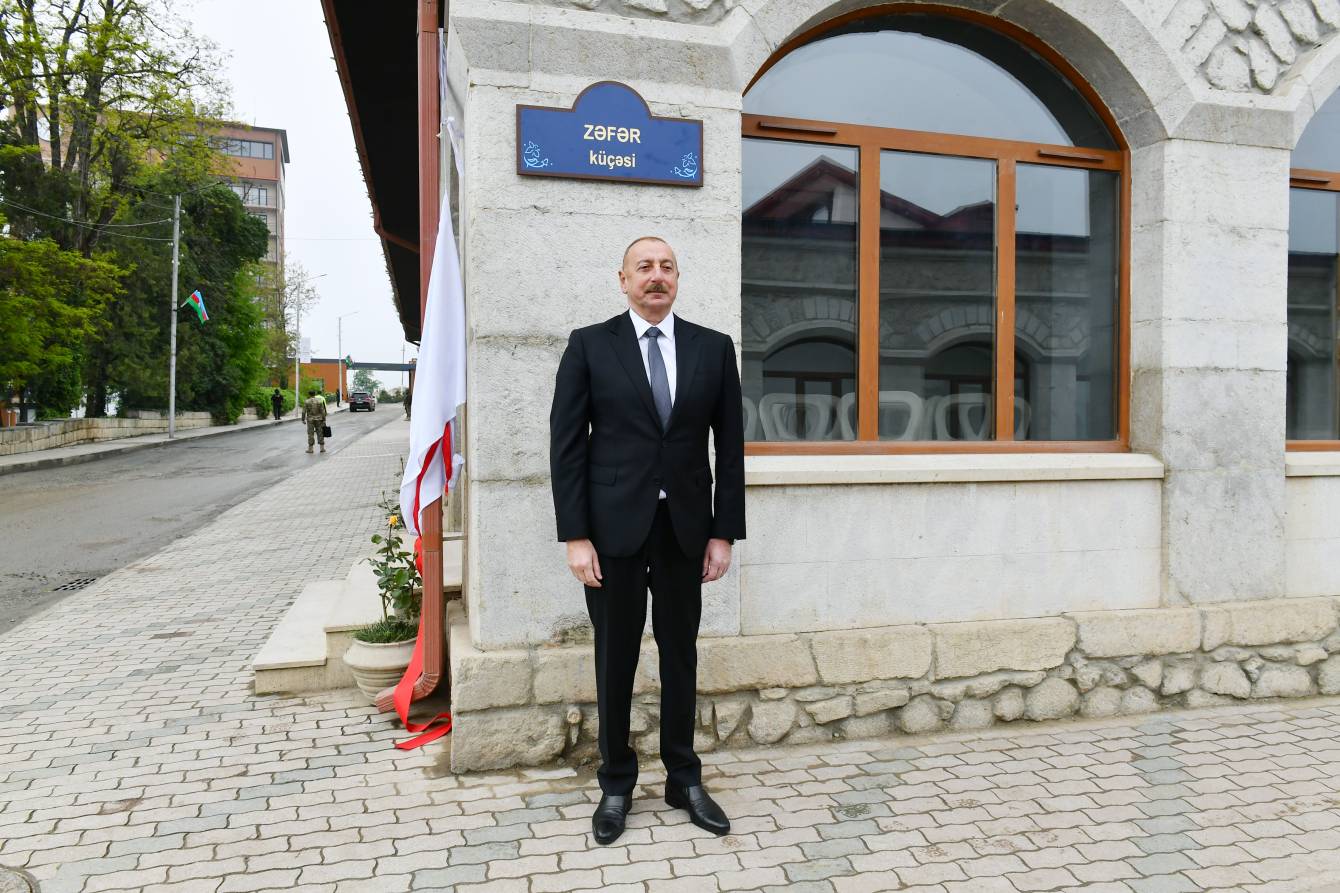President Ilham Aliyev has attended several groundbreaking ceremonies and infrastructure project inaugurations in the liberated city of Shusha. The visit highlighted the extensive reconstruction efforts in Azerbaijan’s historic city following the 44-day Second Karabakh War in 2020.
Caspian News has highlighted the key takeaways from the president’s visit.
During his visit, President Aliyev inaugurated the Innovative Technologies Center of Shusha Electric Networks, managed by national electricity operator “Azerishig” Company, and laid the foundation stone for a non-residential building on Garabagh (Karabakh) Street.
The president also paid a visit to the tomb of prominent Azerbaijani artist Mir Mohsun Navvab Garabaghi, which was restored by the Heydar Aliyev Foundation, in the Jidir Duzu Plain. He further attended the inauguration of the Mehmandarovs Estate Complex, after a significant overhaul carried out by the Heydar Aliyev Foundation, and viewed the project for redesigning the square in front of an administrative building of the Shusha Special Administration.
During his visit, President Aliyev unveiled the name plaques of several streets, including Heydar Aliyev, Victory, Vagif, Panahali Khan, Ataturk, Iron Fist, Garabagh, November 8, and Khan Shushinski. He also toured the construction site of a 17-building residential complex and broke the ground for a 23-building residential quarter in the city center. Additionally, he attended the event dedicated to the start of the reconstruction at the Shusha Government Services Center.
The president also witnessed the inauguration of several key projects such as the Shusha Hotel-Congress Center Complex, the Shusha Creative Center, and the Shusha Branch of the National Carpet Museum. Furthermore, he attended the opening of the historic Govhar Agha Mosque after a significant reconstruction effort.
“Having been here in Karabakh and East Zangezur for about 10 days now, I can see firsthand again that Karabakh and Eastern Zangezur are reviving, roads, bridges, tunnels, power plants, water reservoirs, schools, hospitals, residential buildings, mosques are being built, rebuilt or renovated, electricity transmission lines are being extended. The interests of the people of Azerbaijan are at the core of all this creative work,” President Aliyev said in his address to the people of Azerbaijan in Shusha on Thursday.
Shusha – the Cultural Capital of Azerbaijan
Shusha is a historically and geographically significant city in the Karabakh (Garabagh) region of Azerbaijan, known for its economic, administrative, and cultural importance. The city was founded in the 18th century by the Azerbaijani Karabakh khanate’s Panahali khan, who wanted to build an “eternal and invincible fortress in a firm and impassable place in the mountains.”
Shusha quickly became a prominent trade center, with merchants bringing goods from other Azerbaijani cities such as Baku, Sheki, Nakhchivan, and Ganja, as well as trading with the Ottoman Empire, Russia, Iran, India, and various European countries. The city played a key role in the development of Azerbaijan’s carpet-weaving industry and became the Karabakh region’s carpet-weaving center in the second half of the 19th century. The ornamental and plot groups of Shusha carpets defined the mainline trend in local carpet-weaving. In terms of music, Shusha is known as “the temple of Azerbaijani music" and the conservatory of the South Caucasus, with one of the leading schools of mugham.
However, the city faced serious problems after being occupied by Tsarist Russia in the early 19th century. Under the auspices of the Tsarist government, Armenians began to oust Azerbaijanis, who were the Karabakh region’s indigenous inhabitants.
Between 1905-1906, Azerbaijanis were subjected to a brutal terror and genocide campaign, while Armenians attempted to occupy Shusha multiple times from 1918-1920. After the Soviet Union was established in 1922, Armenians in the Karabakh region repressed the Azerbaijani population further. The autonomy granted to the region within Azerbaijan in 1923, with Khankendi as its center, led to Shusha losing its status as the administrative center. Consequently, the quality of life for Azerbaijanis in the region significantly deteriorated, and many historical and architectural monuments belonging to Azerbaijanis were destroyed. As a result, the city’s population decreased from around 44,000 people in 1917 to 14,000 people in 1970 due to the massive expulsion of ethnic Azerbaijanis.
Following the dissolution of the Soviet Union in 1991, Armenia occupied 20 percent of Azerbaijan’s internationally recognized territories, including Shusha. Azerbaijan’s sovereignty over the city was restored on November 8, 2020, during a 44-day-long counter-offensive operation from September 27 through November 9, 2020. The liberation of Shusha played a crucial role in the retreat of Armenia’s forces and the cessation of hostilities.







 Armenian sappers commenced on Monday mine-clearance operations in the territories adjacent to the Saint Mary Church in village of Voskepar (Armenia...
Armenian sappers commenced on Monday mine-clearance operations in the territories adjacent to the Saint Mary Church in village of Voskepar (Armenia...
 Iran and Pakistan have signed eight cooperation documents in various fields, and agreed to strengthen ties to fight terrorism in the region.
Iran and Pakistan have signed eight cooperation documents in various fields, and agreed to strengthen ties to fight terrorism in the region.
 President Aliyev emphasized the critical role of the North-South Transport Corridor in fostering transport cooperation between Azerbaijan and Russi...
President Aliyev emphasized the critical role of the North-South Transport Corridor in fostering transport cooperation between Azerbaijan and Russi...



